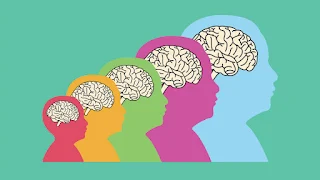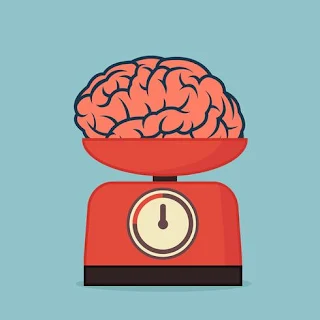15 Things You Probably Didn't Know About the Brain
Brain is the most complex organ of our body, we know many things about brain,
but still many mysteries to unfold, here are some facts about brain you
probably didn't know.
1. The brain consists of three parts.
- Forebrain: Controls all thoughts, senses, motor functions, amotian & hunger. By far the largest region of your brain is the forebrain, which contains the entire cerebrum and several structures directly nestled within it
- MidBrain: Controls auditory and visual reflexes as well as awareness. The midbrain is the topmost part of the brainstem, the connection central between the brain and the spinal cord
- HindBrain: Controls coordination and analysis of senses. It includes most of the brainstem and a dense coral-shaped structure called the cerebellum. The brainstem is one of the most important parts of the entire central nervous system, because it connects the brain to the spinal cord and coordinates many vital functions, such as breathing and heartbeat.
2. The brain has two hemispheres.
- Left: For analytical thoughts. The left side of the brain controls the right side of the body. If the left side of the brain is dominant, the person is logical and more academically inclined.
- Right: For creative thoughts. The right side of the brain controls the left side of the body. A right hemisphere dominant person excels in arts. It is visual and intuitive. It is also called the analog brain.
3. The belief that we only use 10% of our brains is a myth.
Ever portion has a function and is hard at work.
Functional magnetic resonance imaging (fMRI), can measure activity in the
brain while a person is performing different tasks. Using this and similar
methods, researchers show that most of our brain is in use most of the time,
even when a person is performing a very simple action. A lot of the brain is
even active when a person is resting or sleeping.
4. Brain uses 20 watt energy.
The human brain’s low energy requirements of just 20 watts–barely enough to
run a dim light bulb. The brain makes up 2% of a person's weight. Despite
this, even at rest, the brain consumes 20% of the body's energy. The brain
consumes energy at 10 times the rate of the rest of the body per gram of
tissue. The average power consumption of a typical adult is 100 Watts and the
brain consumes 20% of this making the power of the brain 20 W.
If you are worried about your health then read 10 Myths About the Flu That You Shouldn't Ignore.
5. The human brain is 60% fat.
The human brain is nearly 60 percent fat. We've learned in recent years that
fatty acids are among the most crucial molecules that determine your brain's
integrity and ability to perform. Essential fatty acids (EFAs) are required
for maintenance of optimal health but they can not synthesized by the body and
must be obtained from dietary sources.
6. Learning second language before age 5 changes how the brain will develop later in life.
These children's brain are able to produce denser gray matter, neurons by
adulthood. The age at which children learn a second language can have a
significant bearing on the structure of their adult brain, according to a new
joint study by the Montreal Neurological Institute and Hospital -- The Neuro
at McGill University and Oxford University.
7. If the brain were a hard drive it would hold 2.5 million gigabytes of information.
According to a 2010 article in Scientific American, the memory capacity of the
human brain was reported to have the equivalent of 2.5 petabytes of memory
capacity. As a number, a “petabyte” means 1024 terabytes or a million
gigabytes, so the average adult human brain has the ability to store the
equivalent of 2.5 million gigabytes digital memory.
8. The Master of Memory is Ben Pridmore.
He is able to memorize the order of a deck of cards in 26.38
seconds. Pridmore is a three-time World Memory Champion winning the title
2004, 2008 and 2009. From Derby in the United Kingdom, Pridmore achieved this
by winning a 10-discipline competition, the World Memory Championship, which
has taken place every year since 1991. He has also earned the prestigious
title of Master of Memory.
9. What you eat affects your brain:
One study of one-million students in New York showed people who ate a lunch
without preservatives or artificial dyes scored 14% higher on IQ tests.
Another study showed people that ate seafood at least once a week had a 30%
lower occurrence of dementia.
10. 20% of the oxygen you inhale is used by the brain.
Energy in the brain is generated almost exclusively from a form of metabolism
that requires oxygen. However, neurons only maintain a small reserve of energy
and these cells require a continuous supply of oxygen, especially when the
cells are firing and communicating with their neighbors. In fact, the
brain’s oxygen demands are enormous; despite comprising only 2 percent of the
body, our brains consume 20 percent of the body’s oxygen supply.
11. Size doesn't always matter.
Einstein's brain weighted 1,230 grams.
Average male's brain weighs 1,360 grams.
Albert Einstein, who had an average-sized brain, would have been out of
luck!
12. Einstein's brain is split into 240 sperate slides.
When he died in Princeton Hospital, on April 18, 1955, the pathologist on
call, Thomas Harvey, stole it. Harvey soon lost his job at the Princeton
hospital and took the brain to Philadelphia, where it was carved into 240
pieces and preserved in celloidin, a hard and rubbery form of cellulose. He
divvied up the pieces into two jars and stored them in his basement.
14. There is truth behind the saying men are rational and women are emotional.
Men process information primarily from the left side of the brain.
Women tend to use both sides at the same time.
Women are more emotional because they have a larger libie system regulates
emotion.
yet, men have a larger inferior-parietal labule that controls mathematical
ability.
15. In rare cases the brain goes haywire and these occur.
- Exploding Head Syndrome: Indicating hears a loud band coming from the middle of their head.
- Phantom Extra Limb Syndrome: You think you have more limbs than you actually have.
- Sleep paralysis: The inability to move your limbs upon waking up from sleep because the brain is still in REM mode.














